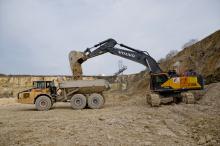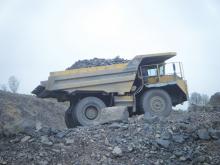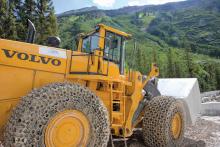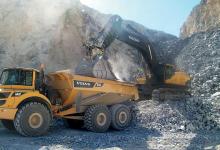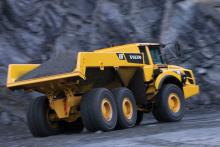In Russia, the Ministry for Industry established the Gurovo Beton quarry in the Tula region south of Moscow in 1951.
RSSIn Russia, the Ministry for Industry established the Gurovo Beton quarry in the Tula region south of Moscow in 1951. The 1960s and 1970s were periods of boom for the quarry but the late 1990s saw severe recession in Russia, with limestone output falling to very low levels. In 2006 2551 HeidelbergCement acquired a majority stake in the company and the whole quarry is being modernised. In addition to a new Austrian crusher, a Chinese cement plant has been built, new conveyors installed and offices upgraded. But key to its long term success is a comprehensive modernisation of the quarry's mobile machinery. A new fleet of 2394 Volvo equipment has arrived, comprising wheel loaders (L90E, L110F, L150F, three L220F and L220E), an EC210Blc excavator, an EC700B LC excavator - and three A40E articulated haulers.
These new machines are not replacing older machines but are fundamentally changing the way the quarry works. One of the biggest problems the quarry faces is how to remove the extremely thick overburden covering the limestone, which ranges from 40 to over 50m thick. In the past the quarry has used an old and unreliable high voltage electric powered excavator, which cut away at a face 11m high.
The electric excavators will be replaced over the next year by Volvo's 70tonne excavator, fitted with a 5m³ bucket and cutting at a smaller 8m high face. The smaller EC210B LC is fitted with a hydraulic hammer for breaking up the daily blasted rocks that are too big to go into the crusher.
The EC700B LC feeds either one of the dozen 30 and 45tonne Belorussian-made Belaz rigid haulers - or the 39tonne A40E Volvo articulated haulers. The Volvos are proving efficient at removing the overburden, as their underbody heaters dislodge the wet and sticky red/black clay, and avoid 'carry-back'. Despite being oil rich, fuel is not cheap in Russia, so the fuel efficiency of the Volvo machines has also been an important benefit.
These new machines are not replacing older machines but are fundamentally changing the way the quarry works. One of the biggest problems the quarry faces is how to remove the extremely thick overburden covering the limestone, which ranges from 40 to over 50m thick. In the past the quarry has used an old and unreliable high voltage electric powered excavator, which cut away at a face 11m high.
The electric excavators will be replaced over the next year by Volvo's 70tonne excavator, fitted with a 5m³ bucket and cutting at a smaller 8m high face. The smaller EC210B LC is fitted with a hydraulic hammer for breaking up the daily blasted rocks that are too big to go into the crusher.
The EC700B LC feeds either one of the dozen 30 and 45tonne Belorussian-made Belaz rigid haulers - or the 39tonne A40E Volvo articulated haulers. The Volvos are proving efficient at removing the overburden, as their underbody heaters dislodge the wet and sticky red/black clay, and avoid 'carry-back'. Despite being oil rich, fuel is not cheap in Russia, so the fuel efficiency of the Volvo machines has also been an important benefit.



